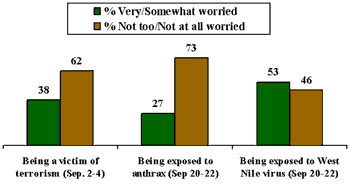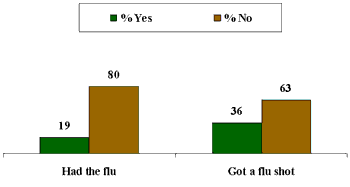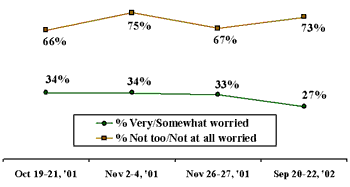GALLUP NEWS SERVICE
PRINCETON, NJ -- Although medicine has eradicated some of the worst health scourges of human history, the introduction of West Nile virus to the United States in 1999 and anthrax bioterrorism in 2001 have given Americans two additional ailments to be worried about. And just as the risk of West Nile virus (along with the mosquitoes that spread it) temporarily fades with the end of summer, flu season is about to begin.
Recent Gallup polling shows that fewer Americans are worried about anthrax exposure than are worried about being affected by further acts of terrorism against the United States, more generally. But concern about contracting West Nile virus exceeds both of these terrorism-related worries.
| Terrorism/Health Concerns Comparison |
 |
While West Nile virus and anthrax exposure are attention grabbers, the common flu is a far more relevant health risk for most Americans. The national Centers for Disease Control and Prevention (CDC) estimates that "an average of about 20,000 people per year in the United States die from the flu, and 114,000 per year have to be admitted to the hospital" as a result of flu-related complications.
Gallup does not have a measure of public concern about the flu comparable to that about anthrax and the West Nile virus, but more than a third of Americans (36%) told Gallup in a Sept. 20-22 survey that they obtained a flu shot in the past 12 months. This is at least indicative that the prevalence of public concern about getting this common ailment is 36%, if not greater. That is almost double the number who say they experienced influenza in the past year -- defined as having fever and cold-like symptoms lasting a week or more.
| Flu Events in the Past 12 Months |
 |
| Sept. 20-22, 2002 |
Trends in Fear of Anthrax
There has been little change since last fall in Americans' fear about themselves or a family member being exposed to anthrax. Even at the height of publicity surrounding anthrax incidents last fall (the first known case was revealed to the public on Oct. 4, 2001), only a third of the public said they were very or somewhat worried about being affected. Today that figure is slightly lower at 27%.
| Worry About Self or Family Member Getting Anthrax |
 |
The criminal investigation into the anthrax attacks has thus far resulted in no arrests. However, Americans' lack of concern about anthrax may be partly responsible for their mostly uncritical view of that investigation. Sixty-four percent say they are satisfied with the way the investigation is going; only 29% are dissatisfied. Despite this, Americans are less optimistic today than they were in November of last year about the prospects of identifying and punishing the people responsible for sending anthrax-laced letters through the mail. Only 15% of Americans today believe this is "very likely," down from 21%.
The other major bioterrorist weapon that government officials fear could be used against the United States is the smallpox virus. While Gallup has not measured public fear of this disease, a survey by Time/CNN last fall found that fear of smallpox was similar to that of anthrax. Their November 2001 survey found 46% of Americans either very or somewhat concerned that they or a family member would contract smallpox, similar to the 49% who were very or somewhat worried about anthrax. Whether that similarity in fear levels exists now that the government has begun stockpiling new vaccinations for the disease and the CDC has issued specific smallpox outbreak response guidelines, is unclear.
Flu Facts
Gallup's recent data indicating that 19% of Americans had flu symptoms in the past 12 months conforms to estimates by the CDC that "about 10% to 20% of U.S. residents will get the flu each year."
The Gallup survey indicates that younger adults are particularly prone to getting the flu. Because the flu is a contagious disease transmitted by direct contact with flu sufferers or exposure to flu germs on surfaces such as door handles and ATM machines, it is possible that this age factor is explained by differences in younger and older people's living patterns.
|
Flu Sufferers in Past Year by Age
|
|||
|
18-29 |
30-49 |
50-64 |
65+ |
|
30% |
22 |
11 |
10 |
Another explanation could be that rates of flu vaccination vary by age. In addition to asking respondents whether they got the flu in the past year, Gallup asked whether respondents had received a flu shot during this period. The results by age are striking, with seniors being about twice as likely to get the shot as those under age 65.
|
Flu Shot in Past Year by Age
|
|||
|
18-29 |
30-49 |
50-64 |
65+ |
|
33% |
25 |
35 |
68 |
But, because middle-aged Americans are not more likely than young adults to have received a flu shot -- but are nevertheless less likely to get the flu -- it appears that vaccination, alone, does not explain the fact that the incidence of flu decreases with age.
Who Is Most Worried About Contracting West Nile Virus?
Gallup's latest survey shows that women are slightly more worried than men about themselves or someone in their family contracting West Nile virus. Almost six in 10 women (59%) are very or somewhat worried compared to 47% of men. Gallup sees a similar 10-point gender gap in worry about anthrax exposure (32% of women vs. 22% of men).
There is also an important regional component to public attitudes on this issue. The CDC's latest West Nile virus case count indicates that thus far in 2002, there have been roughly 2,500 confirmed cases of the disease, covering 32 different states, and resulting in 125 deaths. The largest number of deaths have occurred in Illinois (33), Louisiana (14), Michigan (21) and Ohio(12). The American West has been spared the most, with only one case being reported west of the Rocky Mountains (in California) and no deaths.
Consistent with these statistics, public concern about getting West Nile is fairly high in all regions but the West. However, despite the high number of deaths in Illinois, Michigan and Ohio, among the other Midwestern states afflicted, only 11% of Midwesterners say they are "very worried" about getting the disease. This figure is almost twice as high in the East and South.
|
Personal Concern About West Nile Virus by Region |
||||
|
East |
Midwest |
South |
West |
|
|
% |
% |
% |
% |
|
|
Very worried |
20 |
11 |
19 |
7 |
|
Somewhat worried |
35 |
47 |
44 |
26 |
|
Not too worried |
29 |
31 |
24 |
39 |
|
Not worried at all |
15 |
11 |
12 |
28 |
|
Total worried |
55 |
58 |
63 |
33 |
Persons over the age of 50 are reported to be most susceptible to getting the more serious forms of West Nile virus. Interestingly, however, the Gallup data show that young adults express higher levels of acute fear about contracting it. Taking both acute and moderate fear into account however, fear levels are about equal by age.
|
Fear of Self or Family Member Getting West Nile Virus, by Age |
||||
|
18-29 |
30-49 |
50-64 |
65+ |
|
|
% |
% |
% |
% |
|
|
Very worried |
22 |
14 |
13 |
12 |
|
Somewhat worried |
29 |
44 |
37 |
40 |
|
Not too worried |
33 |
28 |
31 |
31 |
|
Not worried at all |
15 |
14 |
19 |
17 |
|
Total worried |
51 |
58 |
50 |
52 |
Survey Methods
These results are based on telephone interviews with a randomly selected national sample of 1,010 adults, aged 18 and older, conducted Sept. 20-22, 2002. For results based on this sample, one can say with 95%confidence that the maximum error attributable to sampling and other random effects is ±3 percentage points. In addition to sampling error, question wording and practical difficulties in conducting surveys can introduce error or bias into the findings of public opinion polls.
How worried are you that you or someone in your family will be exposed to anthrax -- very worried, somewhat worried, not too worried, or not worried at all?
|
|
|
|
Not |
Already exposed (vol.) |
|
||
|
% |
% |
% |
% |
% |
% |
||
|
2002 Sep 20-22 |
6 |
21 |
37 |
36 |
0 |
* |
|
|
2001 Nov 26-27 |
7 |
26 |
34 |
33 |
* |
* |
|
|
2001 Nov 2-4 ^ |
10 |
24 |
37 |
28 |
0 |
1 |
|
|
2001 Oct 19-21 |
7 |
27 |
35 |
31 |
0 |
* |
|
|
^ |
Based on half sample. |
||||||
Are you satisfied or dissatisfied with the way the investigation into the anthrax cases is going?
|
Satisfied |
Dissatisfied |
No opinion |
|
|
2002 Sep 20-22 |
64% |
29 |
7 |
How likely is it that the U.S. government will be able to identify and punish the people responsible for the recent cases involving anthrax and bring them to justice -- very likely, somewhat likely, not too likely, or not at all likely?
|
Very |
Somewhat |
Not too |
Not at all |
No |
|
|
% |
% |
% |
% |
% |
|
|
2002 Sep 20-22 |
15 |
42 |
32 |
10 |
1 |
|
2001 Nov 26-27 |
21 |
45 |
28 |
6 |
* |
How worried are you that you or someone in your family will be exposed to the West Nile Virus -- very worried, somewhat worried, not too worried, or not worried at all?
|
|
|
|
Not |
Already exposed (vol.) |
|
|
|
2002 Sep 20-22 |
15% |
38 |
30 |
16 |
0 |
1 |
Did you have influenza, also known as the flu, in the last 12 months, where you suffered fever and cold-like symptoms that lasted a week or more?
|
Yes |
No |
No opinion |
|
|
2002 Sep 20-22 |
19% |
80 |
1 |
Did you get a flu shot in the past 12 months, or not?
|
Yes |
No |
No opinion |
|
|
2002 Sep 20-22 |
36% |
63 |
1 |
